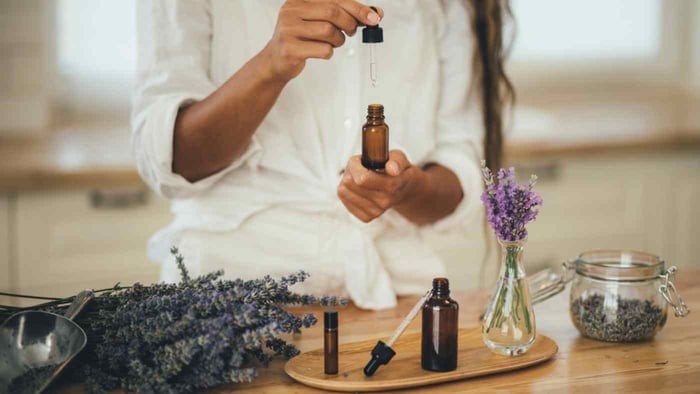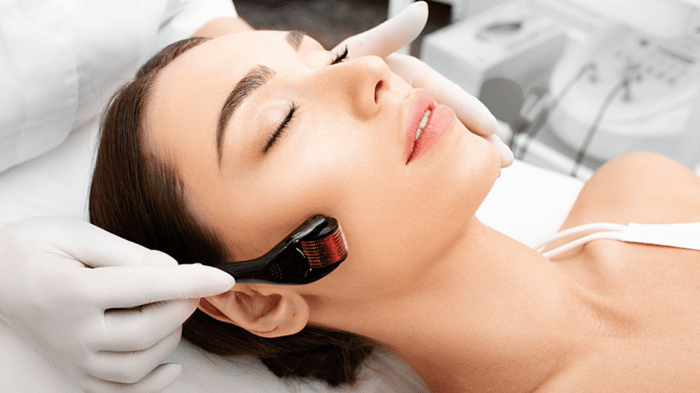By Hannah Kohut

We’ve all heard about retinol. We see it in so many different tv commercials and Instagram ads, the latter of which seemingly targeting us more and more as we age.
Well, that is for good reason. Retinol is proven to be one of the best defenses against premature aging, fine lines, wrinkles, enlarged pores, and more. It can be found in over-the-counter beauty products like creams and serums and in different strengths to meet different skincare needs. But what is it, exactly? In this article, we take a deep dive into the science of retinol, where it comes from, what it treats, and a few great products we recommend.
What is Retinol?
Retinol is a skincare powerhouse ingredient that comes from Vitamin A. It is also known as Vitamin A1, and is a form of retinoid (more on retinoids later in this article). According to Mayo Clinic, Vitamin A is important for cell division and reproduction, and has antioxidant properties. In fact, Vitamin A is the first ever vitamin approved by the FDA for anti-aging skin benefits!

Most natural sources of Vitamin A come from foods such as fish, dairy, dark greens, sweet potatoes, and carrots. However, in the skincare industry, according to AllPlants, retinol derived from food isn’t stable enough once added to cosmetics, so it is created synthetically. This is welcome news for those who are vegan or who are against the use of animal products in their skincare products.
Retinol is also a popular at-home choice to stave off aging skin as opposed to going in for professional laser or chemical peel treatments.
It’s worth noting that retinol does make your skin more prone to sunburn and sun damage, so always use caution when going outdoors and wear sunscreen.
What Does Retinol Do?
Up until our 30s, our skin experiences cell turnover approximately every 28 days, so once a month. This is what helps keep our face looking fresh, smooth, and youthful. However, once we hit our mid 30s, that cell turnover starts to slow down to once every 40 to 70 days, with the cell turnover taking longer as we age.
That lack of turnover is what gives us the dull skin, fine lines, dark spots, and wrinkles.

Retinol helps reverse some of the effects of slow cell regeneration (read: aging skin) by accelerating our skin’s cell turnover. Once retinol is absorbed topically, your skin essentially starts acting like it is younger. With higher cell turnover, you start to see those wrinkles, lines, and dark spots diminish.
You won’t see improvement overnight, so it’s important to stick to your treatment regimens. Results can be seen in as little as 8 weeks and up to 12 weeks to a year for the most stubborn aging skin. But be patient – the results are worth it!
What Does Retinol Treat?

Retinol can treat just about any skin concern – not just aging skin (it’s even used to treat acne in teens and younger adults).
- Fine lines and wrinkles
- Dark spots
- Acne and acne scarring
- Oily skin (regulated sebum production)
- Enlarged pores
- Dully, flaky skin
- Uneven skin tone and texture
- Boost collagen production
Looking at that list, you may think retinol is a blanket, miracle ingredient to wipe out all of these skin concerns, but of course, it’s not that simple. Next, we get into the different types of retinol and when and how they should be used.
What Type of Retinoid Should You Use?
This all depends on your specific skin type and skincare needs, as retinoid is not a one-size-fits-all ingredient. There are several different types of retinol, and each has its own purpose. For instance, the retinol you would use for sensitive skin would be far less powerful that one you would use for acne.
Types of OTC Retinoids

As long as a product contains 2% or less of retinol, it is safe for over-the-counter use.
Even still, they can cause sensitivity to your skin, so always start slowly. Use small amounts at first, and apply every other day/night instead of daily/nightly. Let your skin adjust to it and learn its tolerance before ramping up your regimen.
Here are a few OTC retinoids and how they are best used:
Retinyl palmitate
- Most gentle form of retinoid
- Ideal for sensitive or dry skin
- Use at first sign of wrinkles
Retinol
- Great for most skin types
- Found in most OTC skincare products
- Treats a broad range of aging skin concerns
- Might be too strong for very dry or sensitive skin
Retinaldehyde
- A step up in strength from traditional retinol
- Strongest of OTC retinoids
- Produces faster results, but often with more irritation (dryness, burning)
Adapalene
- Perfect for those with both aging skin and acne
- Has been called a superstar ingredient for treating acne
- Decreases inflammation while regulating cell turnover
- Still effective on dark spots, lines, and wrinkles
Types of Prescription Retinoids

Sometimes, over-the-counter retinoids just aren’t enough for the most stubborn of skin. In these cases, prescription retinoids become your weapon of choice. They are much stronger than OTC retinoids (which can contain only up to 2% of retinol) and come with more side effects. However, your dermatologist or skin care professional will assess the risk vs reward and give you a prescription best suited for your skincare needs.
According to Skin Wellness Dermatology, here are some prescription retinoids and their uses:
Tretinoin
- Commonly known as Retin-A
- Pure form of retinoic acid
- Much stronger than OTC and comes with extra side effects
- Used to treat acne, melasma, and hyperpigmentation
Tazarotene
- Strongest of topical retinoids (available in cream, gel, and foam)
- Treats psoriasis, acne, and photoaging
- The most drying of retinoids (especially the gel formula)
Isotretinoin
- Commonly known as Accutane
- This is an oral form of retinoid, not topical
- Strongest of the retinoids, and is normally used on the worst acne
- Permanently reduces size of oil glands and oil production
Retinol vs Retinoid

You often hear “retinol” and “retinoid” used interchangeably. It’s easy to get these two ingredients confused, and rightly so. They are basically the same thing, except retinoids are far stronger and are usually available by prescription only.
Retinol is a sub product of retinoid, and they are both Vitamin A derivatives. Retinoids and retinol both function thanks to retinoic acid. Since retinoids have a higher amount of retinoic acid, they are stronger than retinol and absorb into the skin quicker, leading to faster results.
Retinol has a lower concentration of retinoic acid, which means they work slower, but can be gentler on the skin.
In short, retinol and retinoid do the same thing, but at different strengths and speeds. They both treat the same skin concerns.
Retinol Precautions

Because of the high efficacy of retinol, it does come with some precautions. First, never dive in face first (pun intended) to a retinol product, be it a serum or a cream. Start with a light application only once every other day to see how your skin tolerates it. If you experience burning, redness, or drying, you may be using too strong of a formula, or you may need to reduce your use to only 1-3 days a week.
As mentioned earlier, retinol makes your skin especially sensitive to sun exposure, so be sure to use SPF anytime you step outdoors. Most experts would recommend using retinol only at night, but some formulas are designed for daytime use. Even still, it doesn’t give you a green light to skip the SPF.
Retinol Products We Recommend
After trying my fair share of retinol products over the years, I have a list of favorites.
RoC Retinol Correxion Anti-Aging Wrinkle Night Serum
Roc has been a leader in anti-aging skincare for decades. That’s because their products are not only affordable and available at drugstores…they actually work! These capsules are great in that they deliver just the right amount of product, that way you don't overdo it and experience irritation. It’s made with highly concentrated pure retinol and antioxidants, absorbs quickly, and leaves no sticky or oily residue. I’ve personally seen a slight reduction in my neck wrinkles in only about two weeks of using this product.
Neutrogena Rapid Wrinkle Repair
I was in my late 20s when this amazing product was released. Even though I did not have any visible wrinkles, I wanted to make sure I kept them away for as long as possible. To this day, I thank my use of this product for my hardly-there forehead lines. Remember, you don’t need to wait until you see lines and wrinkles, you can always start early and help hold them off longer.
Paula's Choice Retinol Skin-Smoothing Body Treatment
Retinol isn’t just for your face, as other parts of your body are prone to lines, wrinkles, and dark spots. This body treatment from Paula’s Choice works wonderfully on my hands and decollate.
CeraVe Anti Aging Face Cream with SPF 30 Sunscreen
Here is a retinol treatment that is actually made for day wear. CeraVe, often known for its gentleness on skin, managed to incorporate a retinal plus SPF, making it ideal for day use.
bareMinerals Ageless Phyto-Retinol Face Cream
Saving the best for last, this is hands-down my favorite retinol cream. bareMinerals uses plant-based retinols, which are much less irritating on the skin, yet still deliver amazing results. While it appears to be a thick cream, don’t worry – it absorbs quickly with no greasy residue. They use Phyto-Retinol, a plant-based alternative to retinol, delivering the same effectiveness, without the redness.

Retinols continue to lead the skincare industry because they just plain work. We hope this article gave you some helpful tips to choosing your perfect retinol product and routine. Do you already have a retinol you love or swear by? We’d love to hear from you in the comments or on our social media channels!




